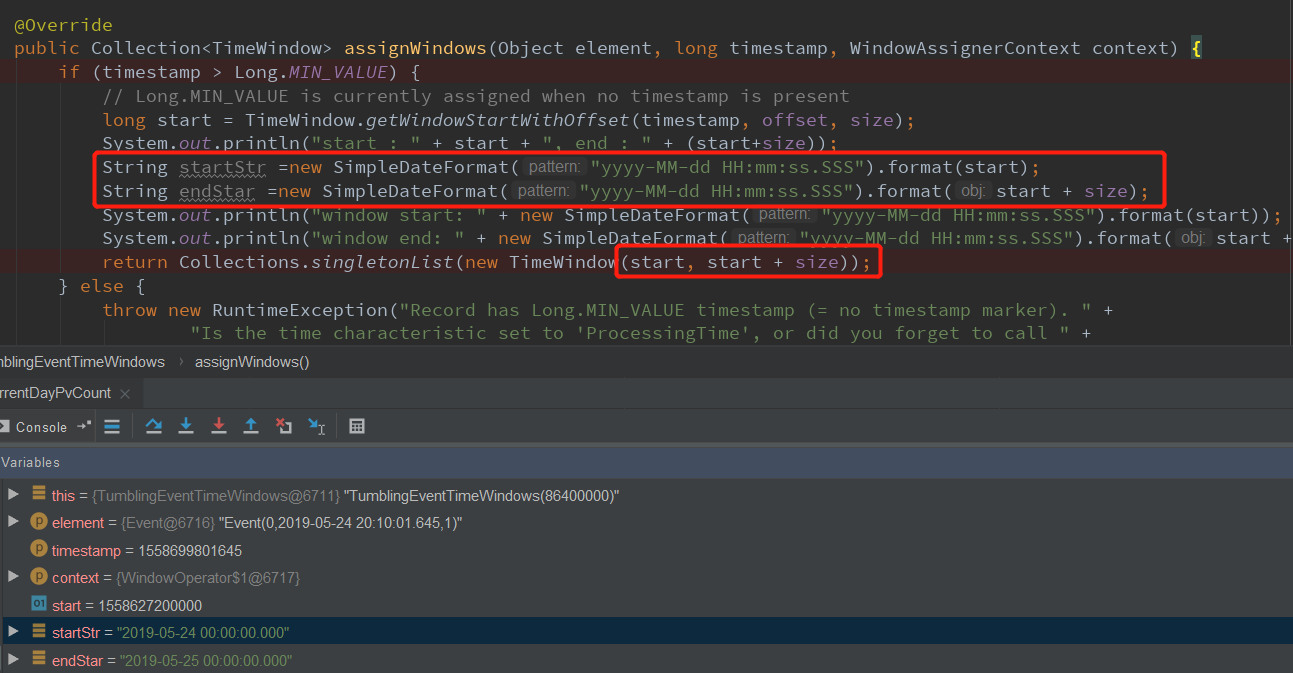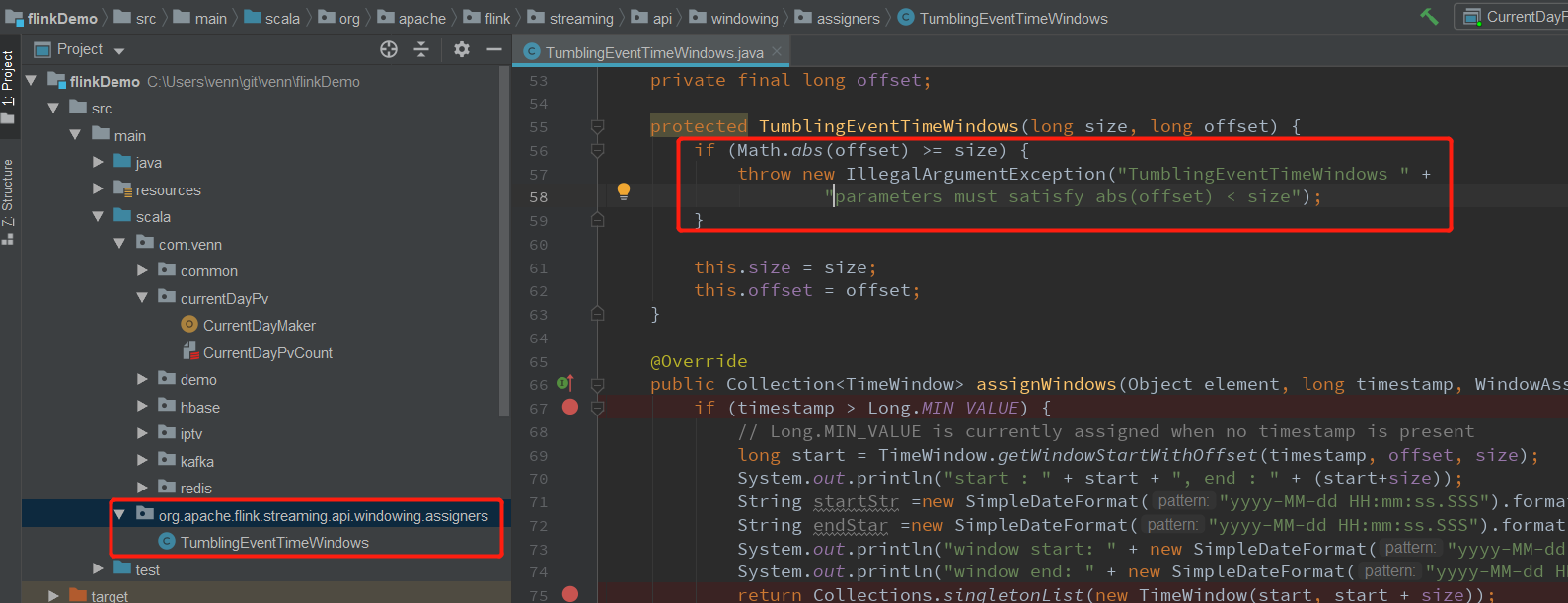Flink统计当日的UV、PV
Flink 统计当日的UV、PV
测试环境:
flink 1.7.2
1、数据流程

a.模拟数据生成,发送到kafka(json 格式)
b.flink 读取数据,count
c. 输出数据到kafka(为了方便查看,输出了一份到控制台)
2、模拟数据生成器
数据格式如下 : {"id" : 1, "createTime" : "2019-05-24 10:36:43.707"}
id 为数据生成的序号(累加),时间为数据时间(默认为数据生成时间)
模拟数据生成器代码如下:
/**
* test data maker
*/ object CurrentDayMaker { var minute : Int = 1
val calendar: Calendar = Calendar.getInstance() /**
* 一天时间比较长,不方便观察,将时间改为当前时间,
* 每次累加10分钟,这样一天只需要144次循环,也就是144秒
* @return
*/
def getCreateTime(): String = {
// minute = minute + 1
calendar.add(Calendar.MINUTE, 10)
sdf.format(calendar.getTime)
}
val sdf = new SimpleDateFormat("yyyy-MM-dd HH:mm:ss.SSS") def main(args: Array[String]): Unit = {
val producer = new KafkaProducer[String, String](Common.getProp)
// 初始化开始时间为当前时间
calendar.setTime(new Date())
println(sdf.format(calendar.getTime))
var i =0;
while (true) { // val map = Map("id"-> i, "createTime"-> sdf.format(System.currentTimeMillis()))
val map = Map("id"-> i, "createTime"-> getCreateTime())
val jsonObject: JSONObject = new JSONObject(map)
println(jsonObject.toString())
// topic current_day
val msg = new ProducerRecord[String, String]("current_day", jsonObject.toString())
producer.send(msg)
producer.flush()
// 控制数据频率
Thread.sleep(1000)
i = i + 1
}
} }
生成数据如下:
{"id" : 0, "createTime" : "2019-05-24 18:02:26.292"}
{"id" : 1, "createTime" : "2019-05-24 18:12:26.292"}
{"id" : 2, "createTime" : "2019-05-24 18:22:26.292"}
{"id" : 3, "createTime" : "2019-05-24 18:32:26.292"}
{"id" : 4, "createTime" : "2019-05-24 18:42:26.292"}
3、flink 程序
package com.venn.stream.api.dayWindow import java.io.File
import java.text.SimpleDateFormat import com.venn.common.Common
import com.venn.source.TumblingEventTimeWindows
import org.apache.flink.api.common.functions.ReduceFunction
import org.apache.flink.api.common.serialization.SimpleStringSchema
import org.apache.flink.api.scala._
import org.apache.flink.contrib.streaming.state.RocksDBStateBackend
import org.apache.flink.formats.json.JsonNodeDeserializationSchema
import org.apache.flink.shaded.jackson2.com.fasterxml.jackson.databind.node.ObjectNode
import org.apache.flink.streaming.api.TimeCharacteristic
import org.apache.flink.streaming.api.functions.timestamps.BoundedOutOfOrdernessTimestampExtractor
import org.apache.flink.streaming.api.scala.StreamExecutionEnvironment
import org.apache.flink.streaming.api.windowing.time.Time
import org.apache.flink.streaming.api.windowing.triggers.{ContinuousEventTimeTrigger}
import org.apache.flink.streaming.connectors.kafka.{FlinkKafkaConsumer, FlinkKafkaProducer} /**
* Created by venn on 19-5-23.
*
* use TumblingEventTimeWindows count current day pv
* for test, update day window to minute window
*
* .windowAll(TumblingEventTimeWindows.of(Time.minutes(1), Time.seconds(0)))
* TumblingEventTimeWindows can ensure count o minute event,
* and time start at 0 second (like : 00:00:00 to 00:00:59)
*
*/
object CurrentDayPvCount { def main(args: Array[String]): Unit = {
println(1558886400000L - (1558886400000L - 8 + 86400000) % 86400000)
// environment
val env: StreamExecutionEnvironment = StreamExecutionEnvironment.getExecutionEnvironment
env.setStreamTimeCharacteristic(TimeCharacteristic.EventTime)
env.setParallelism(1)
if ("\\".equals(File.pathSeparator)) {
val rock = new RocksDBStateBackend(Common.CHECK_POINT_DATA_DIR)
env.setStateBackend(rock)
// checkpoint interval
env.enableCheckpointing(10000)
} val topic = "current_day"
val sdf = new SimpleDateFormat("yyyy-MM-dd HH:mm:ss.SSS")
val kafkaSource = new FlinkKafkaConsumer[ObjectNode](topic, new JsonNodeDeserializationSchema(), Common.getProp)
val sink = new FlinkKafkaProducer[String](topic + "_out", new SimpleStringSchema(), Common.getProp)
sink.setWriteTimestampToKafka(true) val stream = env.addSource(kafkaSource)
.map(node => {
Event(node.get("id").asText(), node.get("createTime").asText())
})
// .assignAscendingTimestamps(event => sdf.parse(event.createTime).getTime)
.assignTimestampsAndWatermarks(new BoundedOutOfOrdernessTimestampExtractor[Event](Time.seconds(60)) {
override def extractTimestamp(element: Event): Long = {
sdf.parse(element.createTime).getTime
}
})
// window is one minute, start at 0 second
//.windowAll(TumblingEventTimeWindows.of(Time.minutes(1), Time.seconds(0)))
// window is one hour, start at 0 second 注意事件时间,需要事件触发,在窗口结束的时候可能没有数据,有数据的时候,已经是下一个窗口了
// .windowAll(TumblingEventTimeWindows.of(Time.hours(1), Time.seconds(0)))
// window is one day, start at 0 second, todo there have a bug(FLINK-11326), can't use negative number, 1.8 修复
// .windowAll(TumblingEventTimeWindows.of(Time.days(1)))
.windowAll(TumblingEventTimeWindows.of(Time.days(1), Time.hours(-8)))
// every event one minute
// .trigger(ContinuousEventTimeTrigger.of(Time.seconds(3800)))
// every process one minute
// .trigger(ContinuousProcessingTimeTrigger.of(Time.seconds(10)))
// every event, export current value,
// .trigger(CountTrigger.of(1))
.reduce(new ReduceFunction[Event] {
override def reduce(event1: Event, event2: Event): Event = { // 将结果中,id的最小值和最大值输出
new Event(event1.id, event2.id, event1.count + event2.count)
}
})
// format output even, connect min max id, add current timestamp
// .map(event => Event(event.id + "-" + event.createTime, sdf.format(System.currentTimeMillis()), event.count))
stream.print("result : ")
// execute job
env.execute("CurrentDayCount")
} } case class Event(id: String, createTime: String, count: Int = 1) {}
4、运行结果
测试数据如下:
{"id" : 0, "createTime" : "2019-05-24 20:29:49.102"}
{"id" : 1, "createTime" : "2019-05-24 20:39:49.102"}
...
{"id" : 20, "createTime" : "2019-05-24 23:49:49.102"}
{"id" : 21, "createTime" : "2019-05-24 23:59:49.102"}
{"id" : 22, "createTime" : "2019-05-25 00:09:49.102"}
{"id" : 23, "createTime" : "2019-05-25 00:19:49.102"}
...
{"id" : 163, "createTime" : "2019-05-25 23:39:49.102"}
{"id" : 164, "createTime" : "2019-05-25 23:49:49.102"}
{"id" : 165, "createTime" : "2019-05-25 23:59:49.102"}
{"id" : 166, "createTime" : "2019-05-26 00:09:49.102"}
...
{"id" : 308, "createTime" : "2019-05-26 23:49:49.102"}
{"id" : 309, "createTime" : "2019-05-26 23:59:49.102"}
{"id" : 310, "createTime" : "2019-05-27 00:09:49.102"}
0 - 21 是 24号
22 - 165 是 25 号
166 - 309 是 26 号
输出结果(程序中reduce 方法,将窗口中第一条和最后一条数据的id,都放到 Event中 )如下:

与测试数据对应
5、说明
很多人会错误的以为,窗口时间的开始时间会是程序启动(初始化)的时间。事实上,窗口(以TumblingEventTimeWindows为例)的定义有两个重载的方法:包含两个参数,窗口的长度和窗口的offset(默认为0)
源码:org.apache.flink.streaming.api.windowing.assigners.TumblingEventTimeWindows :
@PublicEvolving
public class TumblingEventTimeWindows extends WindowAssigner<Object, TimeWindow> {
private static final long serialVersionUID = 1L; private final long size; private final long offset; protected TumblingEventTimeWindows(long size, long offset) {
if (Math.abs(offset) >= size) {
throw new IllegalArgumentException("TumblingEventTimeWindows parameters must satisfy abs(offset) < size");
} this.size = size;
this.offset = offset;
} @Override
public Collection<TimeWindow> assignWindows(Object element, long timestamp, WindowAssignerContext context) {
if (timestamp > Long.MIN_VALUE) {
// Long.MIN_VALUE is currently assigned when no timestamp is present
long start = TimeWindow.getWindowStartWithOffset(timestamp, offset, size);
System.out.println("start : " + start + ", end : " + (start+size));
String startStr =new SimpleDateFormat("yyyy-MM-dd HH:mm:ss.SSS").format(start);
String endStar =new SimpleDateFormat("yyyy-MM-dd HH:mm:ss.SSS").format(start + size);
System.out.println("window start: " + new SimpleDateFormat("yyyy-MM-dd HH:mm:ss.SSS").format(start));
System.out.println("window end: " + new SimpleDateFormat("yyyy-MM-dd HH:mm:ss.SSS").format(start + size));
return Collections.singletonList(new TimeWindow(start, start + size));
} else {
throw new RuntimeException("Record has Long.MIN_VALUE timestamp (= no timestamp marker). " +
"Is the time characteristic set to 'ProcessingTime', or did you forget to call " +
"'DataStream.assignTimestampsAndWatermarks(...)'?");
}
}/**
* Creates a new {@code TumblingEventTimeWindows} {@link WindowAssigner} that assigns
* elements to time windows based on the element timestamp.
*
* @param size The size of the generated windows.
* @return The time policy.
*/
public static TumblingEventTimeWindows of(Time size) {
return new TumblingEventTimeWindows(size.toMilliseconds(), 0);
} /**
* Creates a new {@code TumblingEventTimeWindows} {@link WindowAssigner} that assigns
* elements to time windows based on the element timestamp and offset.
*
* <p>For example, if you want window a stream by hour,but window begins at the 15th minutes
* of each hour, you can use {@code of(Time.hours(1),Time.minutes(15))},then you will get
* time windows start at 0:15:00,1:15:00,2:15:00,etc.
*
* <p>Rather than that,if you are living in somewhere which is not using UTC±00:00 time,
* such as China which is using UTC+08:00,and you want a time window with size of one day,
* and window begins at every 00:00:00 of local time,you may use {@code of(Time.days(1),Time.hours(-8))}.
* The parameter of offset is {@code Time.hours(-8))} since UTC+08:00 is 8 hours earlier than UTC time.
*
* @param size The size of the generated windows.
* @param offset The offset which window start would be shifted by.
* @return The time policy.
*/
public static TumblingEventTimeWindows of(Time size, Time offset) {
return new TumblingEventTimeWindows(size.toMilliseconds(), offset.toMilliseconds());
}
}
每条数据都会触发: assignWindows 方法
计算函数如下:
public static long getWindowStartWithOffset(long timestamp, long offset, long windowSize) {
return timestamp - (timestamp - offset + windowSize) % windowSize;
}
dubug 如下:

6、特别说明
FLink 1.6.3/1.7.1/1.7.2 在 TumblingEventTimeWindows 构造器上有个bug:offset 不能小于0, 但是of 方法中又说明,可以使用: of(Time.days(1),Time.hours(-8)) 表示在中国的 0 点开始的一天窗口。
JIRA :FLINK-11326 ,jira 上注明1.8.0 修复。(我本来准备提个bug的,有人先下手了)
这个bug 可以通过自己创建一个相同包的相同类,将对应代码修改即可。
flink 1.7.2 源码:
protected TumblingEventTimeWindows(long size, long offset) {
if (offset < 0 || offset >= size) {
throw new IllegalArgumentException("TumblingEventTimeWindows parameters must satisfy 0 <= offset < size");
}
this.size = size;
this.offset = offset;
}
最新版源码:
protected TumblingEventTimeWindows(long size, long offset) {
if (Math.abs(offset) >= size) {
throw new IllegalArgumentException("TumblingEventTimeWindows parameters must satisfy abs(offset) < size");
}
this.size = size;
this.offset = offset;
}
修改:

7、上面的案例主要讲Flink 的窗口,pv、uv.keyBy(0)
.window(TumblingProcessingTimeWindows.of(Time.days(1), Time.hours(-8)))
.trigger(ContinuousProcessingTimeTrigger.of(Time.seconds(10)))
.evictor(TimeEvictor.of(Time.seconds(0), true))
.process(new ProcessWindowFunction[(String, String), (String, String, Long), Tuple, TimeWindow] {
/*
这是使用state是因为,窗口默认只会在创建结束的时候触发一次计算,然后数据结果,
如果长时间的窗口,比如:一天的窗口,要是等到一天结束在输出结果,那还不如跑批。
所有大窗口会添加trigger,以一定的频率输出中间结果。
加evictor 是因为,每次trigger,触发计算是,窗口中的所有数据都会参与,所以数据会触发很多次,比较浪费,加evictor 驱逐已经计算过的数据,就不会重复计算了
驱逐了已经计算过的数据,导致窗口数据不完全,所以需要state 存储我们需要的中间结果
*/
var wordState: MapState[String, String] = _
var pvCount: ValueState[Long] = _ override def open(parameters: Configuration): Unit = {
// new MapStateDescriptor[String, String]("word", classOf[String], classOf[String])
wordState = getRuntimeContext.getMapState(new MapStateDescriptor[String, String]("word", classOf[String], classOf[String]))
pvCount = getRuntimeContext.getState[Long](new ValueStateDescriptor[Long]("pvCount", classOf[Long]))
} override def process(key: Tuple, context: Context, elements: Iterable[(String, String)], out: Collector[(String, String, Long)]): Unit = { var pv = 0;
val elementsIterator = elements.iterator
// 遍历窗口数据,获取唯一word
while (elementsIterator.hasNext) {
pv += 1
val word = elementsIterator.next()._2
wordState.put(word, null)
}
// add current
pv += pv + pvCount.value() # fix bug: pv value not add pvCount in state
pvCount.update(pv)
var count: Long = 0
val wordIterator = wordState.keys().iterator()
while (wordIterator.hasNext) {
wordIterator.next()
count += 1
}
// uv
out.collect((key.getField(0), "uv", count))
out.collect(key.getField(0), "pv", pv) }
})
Flink统计当日的UV、PV的更多相关文章
- 有关“数据统计”的一些概念 -- PV UV VV IP跳出率等
有关"数据统计"的一些概念 -- PV UV VV IP跳出率等 版权声明:本文为博主原创文章,未经博主允许不得转载. 此文是本人工作中碰到的,随时记下来的零散概念,特此整理一下. ...
- 淘宝中的UV,PV,IPV
1. UV & PV UV: 店铺各页面的访问人数,一个用户在一天内多次访问店铺被记为一个访客(去重) ; Unique visitors PV: 店铺内所有页面的浏览总量(次数累加); p ...
- MySQL格式化时间戳 统计当日,第二天,第三天,3个工作日以后的数据
mysql 查询出来的处理时间和开始时间都是13位的时间戳 SELECT `END_TIME`,`CREATE_TIME` FROM t_table 需求是统计当日,第二天,第三天,3个工作日以后的时 ...
- 怎么区分PV、IV、UV以及网站统计名词解释(pv、曝光、点击)
PV(Page View)访问量,即页面访问量,每打开一次页面PV计数+1,刷新页面也是. IV(Internet Protocol)访问量指独立IP访问数,计算是以一个独立的IP在一个计算时段内访问 ...
- 程序员修仙之路--优雅快速的统计千万级别uv(留言送书)
菜菜,咱们网站现在有多少PV和UV了? Y总,咱们没有统计pv和uv的系统,预估大约有一千万uv吧 写一个统计uv和pv的系统吧 网上有现成的,直接接入一个不行吗? 别人的不太放心,毕竟自己写的,自己 ...
- 程序员修仙之路--优雅快速的统计千万级别uv
菜菜,咱们网站现在有多少PV和UV了? Y总,咱们没有统计pv和uv的系统,预估大约有一千万uv吧 写一个统计uv和pv的系统吧 网上有现成的,直接接入一个不行吗? 别人的不太放心,毕竟自己写的,自己 ...
- 快速的统计千万级别uv
菜菜,咱们网站现在有多少PV和UV了? Y总,咱们没有统计pv和uv的系统,预估大约有一千万uv吧 写一个统计uv和pv的系统吧 网上有现成的,直接接入一个不行吗? 别人的不太放心,毕竟自己写的,自己 ...
- NGINX结合SHELL统计用户的UV及IP汇总
公司新的需求,怀疑PV和IP的比例不对,看是不是有恶意的东东: NGINX配置: log_format main '$remote_addr - $remote_user [$time_local] ...
- 百度统计数据的UV和IP为什么不一样?
相信网站站长们在每天查看百度统计数据时会发现网站的IP和UV数据时大时小,有时候IP比UV大,有时候UV比IP大,站长们可能对这些情况感到奇怪.今天就和大家分享一下UV和IP的知识,帮助大家更好地做好 ...
随机推荐
- 复旦高等代数 II(15级)每周一题
[问题2016S01] 设 $f(x)=x^n+a_{n-1}x^{n-1}+\cdots+a_1x+a_0$ 是整系数首一多项式, 满足: $|a_0|$ 是素数且 $$|a_0|>1+\s ...
- TCP四路挥手问题:
1.不管被动和主动,只要发送Fin分节就关闭此端应用层.那么挥手时S接到Fin,此刻C已经关闭应用层,那么S再发送消息岂不是无用,浪费网络资源?
- 2019强网杯web upload writeup及关键思路
<?phpnamespace app\web\controller; class Profile{ public $checker; public $filename_tmp; ...
- Fluent批处理之--windows下多个任务的计算 【转载】
转载自http://jingcao830828.blog.163.com/blog/static/10320833620103633624506/ 1.同维多任务的连续计算 对于工程应用来说,计算精度 ...
- Ubuntu16.04启动tomcat缓慢问题之解决方案
问题信息: -May- ::] org.apache.catalina.util.SessionIdGeneratorBase.createSecureRandom Creation of Secur ...
- 如何画好ER图
快速阅读 了解ER图的基本组成,以及如何在viso中画ER图. 什么是ER图 是实体关系图,用矩形表示实体,用椭圆形表示属性,用棱形表示两实体之间的联系.相互用直接联接起来,是一种数据建模工具.用来描 ...
- laravel 通过ftp上传的时候报错 Use of undefined constant FTP_BINARY - assumed 'FTP_BINARY
用Laravel中的filesystems里面的ftp上传文件时报错.在windows上开发,文件上传的时候碰到上面的问题,搜了些资料,发现是php7的ftp拓展默认未开启. filesystems是 ...
- 我大概知道他在说什么了,是对内存单元的竞争访问吧。Python有GIL,在执行伪码时是原子的。但是伪码之间不保证原子性。 UDP丢包,你是不是做了盲发?没有拥塞控制的情况下,确实会出现丢包严重的情况。你先看看发送速率,还有是否带有拥塞控制。
我大概知道他在说什么了,是对内存单元的竞争访问吧.Python有GIL,在执行伪码时是原子的.但是伪码之间不保证原子性. UDP丢包,你是不是做了盲发?没有拥塞控制的情况下,确实会出现丢包严重的情 ...
- linux: 右键添加打开终端
安装一个包,即可在右键里面添加一个“打开终端”的菜单. sudo apt-get install nautilus-open-terminal 注销用户重启,然后再进入就可以右键->在终端打开选 ...
- 改变jupyter notebook的主题背景
https://study.163.com/provider/400000000398149/index.htm?share=2&shareId=400000000398149( 欢迎关注博 ...
